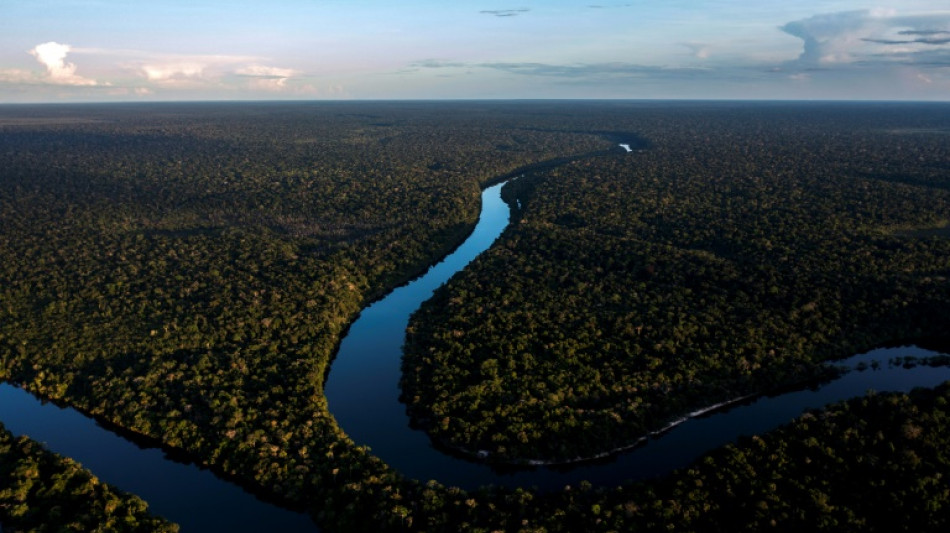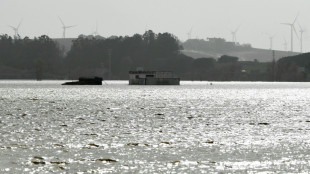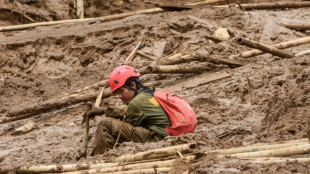
-
 Freeski star Gu says injuries hit confidence as she targets Olympic treble
Freeski star Gu says injuries hit confidence as she targets Olympic treble
-
UK police search properties in Mandelson probe

-
 Bompastor extends contract as Chelsea Women's boss despite slump
Bompastor extends contract as Chelsea Women's boss despite slump
-
Milan-Cortina Winter Olympics open with glittering ceremony

-
 A French yoga teacher's 'hell' in a Venezuelan jail
A French yoga teacher's 'hell' in a Venezuelan jail
-
England's Underhill taking nothing for granted against Wales

-
 Fans cheer for absent Ronaldo as Saudi row deepens
Fans cheer for absent Ronaldo as Saudi row deepens
-
Violence-ridden Haiti in limbo as transitional council wraps up

-
 Hundreds protest in Milan ahead of Winter Olympics
Hundreds protest in Milan ahead of Winter Olympics
-
Suspect in murder of Colombian footballer Escobar killed in Mexico

-
 Colombia's Rodriguez signs with MLS Minnesota United
Colombia's Rodriguez signs with MLS Minnesota United
-
Wainwright says England game still 'huge occasion' despite Welsh woes

-
 WADA shrugs off USA withholding dues
WADA shrugs off USA withholding dues
-
France detects Russia-linked Epstein smear attempt against Macron

-
 Winter Olympics to open with star-studded ceremony
Winter Olympics to open with star-studded ceremony
-
Trump posts, then deletes, racist clip of Obamas as monkeys

-
 Danone expands recall of infant formula batches in Europe
Danone expands recall of infant formula batches in Europe
-
Trump deletes racist video post of Obamas as monkeys

-
 Colombia's Rodriguez signs with MLS side Minnesota United
Colombia's Rodriguez signs with MLS side Minnesota United
-
UK police probing Mandelson after Epstein revelations search properties

-
 Russian drone hits Ukrainian animal shelter
Russian drone hits Ukrainian animal shelter
-
US says new nuclear deal should include China, accuses Beijing of secret tests

-
 French cycling hope Seixas dreaming of Tour de France debut
French cycling hope Seixas dreaming of Tour de France debut
-
France detects Russia-linked Epstein smear attempt against Macron: govt source

-
 EU nations back chemical recycling for plastic bottles
EU nations back chemical recycling for plastic bottles
-
Terror at Friday prayers: witnesses describe blast rocking Islamabad mosque

-
 Iran expects more US talks after 'positive atmosphere' in Oman
Iran expects more US talks after 'positive atmosphere' in Oman
-
US says 'key participant' in 2012 attack on Benghazi mission arrested

-
 Why bitcoin is losing its luster after stratospheric rise
Why bitcoin is losing its luster after stratospheric rise
-
Arteta apologises to Rosenior after disrespect row

-
 Terror at Friday prayers: witness describes 'extremely powerful' blast in Islamabad
Terror at Friday prayers: witness describes 'extremely powerful' blast in Islamabad
-
Winter Olympics men's downhill: Three things to watch

-
 Ice dancers Chock and Bates shine as US lead Japan in team event
Ice dancers Chock and Bates shine as US lead Japan in team event
-
Stellantis takes massive hit on 'overestimation' of EV demand

-
 Stocks rebound though tech stocks still suffer
Stocks rebound though tech stocks still suffer
-
Spanish PM urges caution as fresh rain heads for flood zone

-
 Iran says to hold more talks with US despite Trump military threats
Iran says to hold more talks with US despite Trump military threats
-
Russia accuses Kyiv of gun attack on army general in Moscow

-
 Cambodia reveals damage to UNESCO-listed temple after Thailand clashes
Cambodia reveals damage to UNESCO-listed temple after Thailand clashes
-
Norway crown princess 'deeply regrets' Epstein friendship

-
 Italy set for Winter Olympics opening ceremony as Vonn passes test
Italy set for Winter Olympics opening ceremony as Vonn passes test
-
England's Jacks says players back under-fire skipper Brook '100 percent'

-
 Carrick relishing Frank reunion as Man Utd host Spurs
Carrick relishing Frank reunion as Man Utd host Spurs
-
Farrell keeps the faith in Irish still being at rugby's top table

-
 Meloni, Vance hail 'shared values' amid pre-Olympic protests
Meloni, Vance hail 'shared values' amid pre-Olympic protests
-
Olympic freestyle champion Gremaud says passion for skiing carried her through dark times

-
 US urges new three-way nuclear deal with Russia and China
US urges new three-way nuclear deal with Russia and China
-
Indonesia landslide death toll rises to 74

-
 Hemetsberger a 'happy psychopath' after final downhill training
Hemetsberger a 'happy psychopath' after final downhill training
-
Suicide blast at Islamabad mosque kills at least 31, wounds over 130


Forests could absorb much more carbon, but does it matter?
Protecting forests globally could vastly increase the amount of carbon they sequester, a new study finds, but given our current emissions track, does it really matter?
For Thomas Crowther, an author of the assessment, the answer is a resounding yes.
"I absolutely see this study as a cause for hope," the professor at ETH Zurich said.
"I hope that people will see the real potential and value that nature can bring to the climate change topic."
But for others, calculating the hypothetical carbon storage potential of global forests is more an academic exercise than a useful framework for forest management.
"I am a forester by trade, so I really like to see trees grow," said Martin Lukac, professor of ecosystem science at University of Reading.
However, he considers forest carbon potential calculations like these "dangerous," warning they "distract from the main challenge and offer false hope."
Crowther has been here before: in 2019 he produced a study on how many trees the Earth could support, where to plant them and how much carbon they could store.
"Forest restoration is the best climate change solution available today," he argued.
That work caused a firestorm of criticism, with experts unpicking everything from its modelling to the claim that reforestation was the "best" solution available.
Nodding to the furore, Crowther and his colleagues have now vastly expanded their data set and used new modelling approaches for the study published Monday in the journal Nature.
They use ground-sourced surveys and data from three models based on high-resolution satellite imagery.
The modelling approach is "as good as it currently gets," acknowledged Lukac, who was not involved in the work.
- 'Achieve climate targets' -
The study estimates forests are storing 328 gigatons of carbon less than they would if untouched by human destruction.
Estimates of the world's remaining carbon "budget" to keep warming below the 1.5C range from around 250-500 gigatons.
Much of the forest potential -- 139 gigatons -- could be captured by just leaving existing forests to reach full maturity, the study says.
Another 87 gigatons could be regained by reconnecting fragmented forests.
The remainder is in areas used for agriculture, pasture or urban infrastructure, which the authors acknowledge is unlikely to be reversed.
Still, they say their findings present a massive opportunity.
"Forest conservation, restoration and sustainable management can help achieve climate targets by mitigating emissions and enhancing carbon sequestration," the study says.
Modelling and mapping the world's forests is a tricky business.
There's the scale of the problem, but also the complexity of what constitutes a forest.
Trees, of course, but the carbon storage potential of a woodland or jungle is also in its soil and the organic matter littering the forest floor.
- Trees versus emissions? -
Ground-level surveys can offer granular data, but are difficult to extrapolate.
And satellite imagery covers large swathes of land, but can be confounded by something as simple as the weather, said Nicolas Younes, research fellow at the Australian National University.
"Most of the places where there is potential for carbon storage are tropical countries... these are places where there is persistent cloud cover, therefore satellite imagery is very hard to validate," he told AFP.
Younes, an expert on forest remote sensing, warns the complexity of the study's datasets and modelling risks introducing errors, though the resulting estimates remain "very valuable".
"It will not show us the exact truth for every pixel on Earth, but it is useful."
One objection to quantifying forest carbon potential is that conditions are far from static, with accelerating climate change, forest fires and pest vulnerability all playing a role.
And, for Lukac, whatever potential forests have is irrelevant to the urgency of cutting emissions.
The study's estimated 328 gigatons "would be wiped (out) in 30 years by current emissions," he said.
Crowther, who advises a project to plant a trillion trees globally, rejects an either-or between forest protection and emissions reduction.
"We urgently need both," he said.
F.AbuZaid--SF-PST



